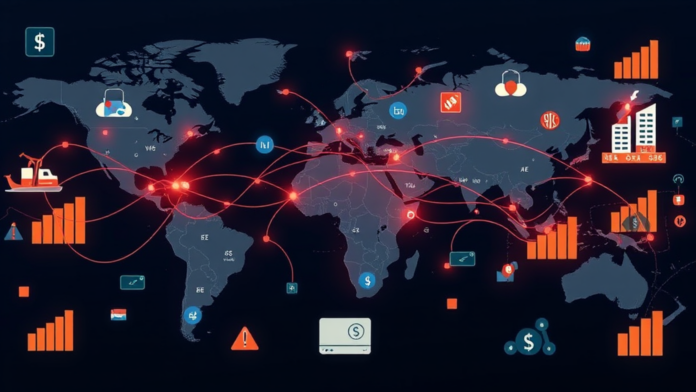Introduction to Global Supply Chain Disruptions
Definition and Overview
Global supply chain disruptions refer to significant interruptions in the flow of goods and services. These disruptions can arise from various factors, including natural disasters, geopolitical tensions, and pandemics. They can lead to delays, increased costs, and reduced availability of products. Understanding these disruptions is crucial for businesses aiming to maintain operational efficiency.
For instance, a recent study highlighted that 75% of companies experient delays due to the pandemic. This statistic is alarming. Companies must adapt to these challenges. They should consider diversifying suppliers and investing in technology. A proactive approach is essential. It can mitigate risks and enhance resilience.
Historical Context and Recent Eventq
Historically, global supply chains have evolved significantly, driven by advancements in technology and globalization. For example, the rise of just-in-time inventory systems has increased efficiency but also vulnerability. This approach minimizes stock levels, which can lead to shortages during disruptions. Recent events, such as the COVID-19 pandemic, have exposed these weaknesses. Many companies faced unprecedented delays and increased costs.
Moreover, geopolitical tensions, such as trade wars, have further complicated supply chain dynamics. These factors create uncertainty in the market. Businesses must navigate these complexities carefully. A strategic response is essential for maintaining competitiveness. Adaptation is key.
Causes of Supply Chain Disruptions
Natural Disasters and Climate Change
Natural disasters and climate change significantly impact supply chains. These events can disrupt production and distribution channels. For instance, hurricanes and floods can damage infrastructure, leading to delays. Such disruptions can increase operational costs. He must consider these risks in his planning.
Additionally, climate change contributes to unpredictable weather patterns. This unpredictability can affect agricultural outputs and raw material availability. Companies may face shortages as a result. He should assess his supply chain vulnerabilities. Proactive measures are essential for risk management.
Geopolitical Tensions and Trade Policies
Geopolitical tensions and trade policies play a crucial role in supply chain disruptions. These factors can lead to tariffs, sanctions, and trade barriers. Such measures increase costs and complicate logistics. Companies must navigate these complexities carefully. He should remain informed about global developments.
Moreover, political instability in key regions can disrupt production. For example, conflicts can halt manufacturing and transportation. This unpredictability creates significant risks for businesses. He must evaluate his supply chain strategies. A thorough risk assessment is vital for resilience.
Impacts on Businesses
Operational Challenges and Cost Increases
Operational challenges and cost increases significantly affect businesses. These challenges often stem from supply chain disruptions, leading to inefficiencies. For instance, delays in raw material delivery can halt production lines. This situation results in lost revenue and increased operational costs. He must analyze these impacts carefully.
Additionally, companies may face higher transportation costs due to fuel price fluctuations. This increase can strain budgets and reduce profit margins. He should consider alternative logistics strategies. Implementing technology can enhance efficiency. A proactive approach is essential for mitigating these challenges.
Effects on Consumer Behavior and Demand
Effects on consumer behavior and demand are critical for businesses. Disruptions in supply chains can lead to product shortages. This situation often results in increased prices, which can deter consumers. He must understand these dynamics to adapt effectively.
Moreover, consumers may shift their preferences during shortages. They might seek alternative products or brands. This change can impact long-term customer loyalty. He should monitor market trends closely. Adapting to consumer needs is essential for success.
Investment Strategies in Response to Disruptions
Diversification of Supply Sources
Diversification of supply sources is a crucial investment strategy. By sourcing materials from multiple suppliers, companies can mitigate risks associated with disruptions. This approach enhances resilience against unforeseen events. He should evaluate potential suppliers carefully.
Additionally, diversifying geographically can reduce dependency on a single region. This strategy can protect against local disruptions, such as natural disasters or political instability. He must analyze the cost implications of this strategy. A well-planned diversification can lead to long-term savings.
Investing in Technology and Automation
Investing in technology and automation is essential for enhancing operational efficiency. By integrating advanced systems, companies can streamline processes and reduce human error. This investment can lead to significant cost savings over time. He should prioritize technologies that offer scalability.
Moreover, automation can improve response times during disruptions. Faster production adjustments can meet changing market demands. He must assess the return on investment carefully. A strategic approach to technology can yield competitive advantages.
Future Outlook and Recommendations
Trends to Watch in Global Supply Chains
Trends in global supply chains indicate a shift towards sustainability and transparency. Companies are increasingly prioritizing eco-friendly practices to meet consumer demand. This focus can enhance brand loyalty and market positioning. He should monitor regulatory changes closely.
Additionally, digitalization is transforming supply chain management. Advanced analytics and real-time tracking improve decision-making processes. He must invest in these technologies for competitive advantage. Adapting to these trends is crucial for long-term success.
Strategic Planning for Resilience
Strategic planning for resilience is essential in today’s volatile market. Companies must develop comprehensive risk management frameworks. This approach helps identify potential vulnerabilities in supply chains. He should conduct regular assessments to stay informed.
Moreover, scenario planning can prepare businesses for various disruptions. By anticipating different outcomes, companies can respond more effectively. He must prioritize flexibility in operations. A resilient strategy can safeguard against unexpected challenges.

